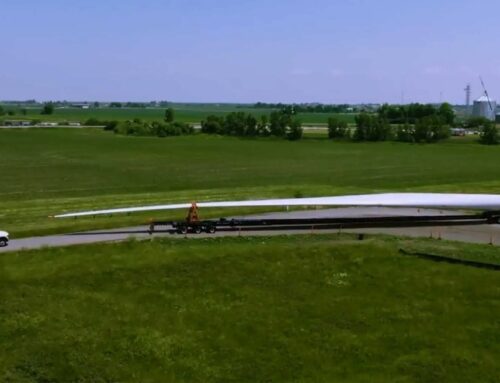Iraq’s first industrial-scale solar plant opens to tackle electricity crisis
September 20, 2025
KARBALA, Iraq — Iraq is set to open the country’s first industrial-scale solar plant Sunday in a vast expanse of desert in Karbala province, southwest of Baghdad.
It’s part of a new push by the government to expand renewable energy production in a country that is frequently beset by electricity crises despite being rich in oil and gas.
“This is the first project of its type in Iraq that has this capacity,” said Safaa Hussein, executive director of the new solar plant in Karbala, standing in front of row after row of black panels. From above, the project looks like a black-clad city surrounded by sand.
The plant aims to “supply the national network with electricity, and reduce the fuel consumption especially during the daytime peak load, in addition to reducing the negative environmental impact of gas emissions,” he said.
The newly opened solar plant in Karbala will eventually be able to produce up to 300 megawatts of electricity at its peak, said Nasser Karim al-Sudani, head of the national team for solar energy projects in the Prime Minister’s Office. Another project under construction in Babil province will have a capacity of 225 megawatts, and work will also begin soon on a 1,000 megawatt project in the southern province of Basra, he said.
The projects are part of an ambitious plan to implement large-scale solar power projects in an effort to ease the country’s chronic electricity shortages.
Deputy Minister of Electricity Adel Karim said Iraq has solar projects with a combined capacity of 12,500 megawatts either being implemented, in the approval process, or under negotiation. If fully realized, these projects would supply between 15% and 20% of Iraq’s total electricity demand, excluding the semi-autonomous northern Kurdish region, he said.
“All the companies we have contracted with, or are still negotiating with, will sell us electricity at very attractive prices, and we will in turn sell it to consumers,” Karim said, although he declined to disclose the purchase rates.
Despite its oil and gas wealth, Iraq has suffered from decades of electricity shortages because of war, corruption and mismanagement. Power outages are common, especially in the scorching summer months. Many Iraqis have to rely on diesel generators or suffer through temperatures that exceed 50 degrees Celsius (122 degrees Fahrenheit) without air conditioning.
Currently, Iraq produces between 27,000 and 28,000 megawatts of electricity, Karim said, while nationwide consumption ranges from 50,000 to 55,000 megawatts. Power plants fueled by Iranian gas contribute about 8,000 megawatts of the current supply.
Iraq’s heavy reliance on imported Iranian gas, as well as electricity imported directly from Iran to meet its electricity needs, is an arrangement that risks running afoul of U.S. sanctions.
Earlier this year, Washington ended a sanctions waiver for direct electricity purchases from Iran but left the waiver for gas imports in place.
—
Abdul-Zahra reported from Baghdad.
Search
RECENT PRESS RELEASES
Related Post



